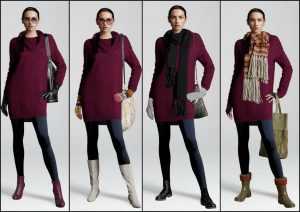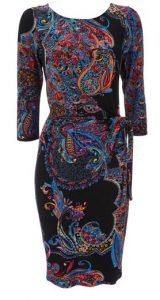
Hello again all you lovely readers! Corporate Curves was attending an intense management course last week, but here I am again. Today’s topic comes from a news article that caught my eye a few weeks ago about a study that examines how teachers judge their colleagues by how they dress. According to the study, hardly anyone found anything wrong with how they dressed themselves, but they certainly had opinions on how their colleagues dressed and how it affected their credibility as teachers.
The categories found in the study were:
- model citizens who emphasize appropriateness and ordinariness;
- unconventional rebels who dress to push the limits and reinvigorate how their profession is seen by dressing casually and looking approachable to their students; and
- sexualized teachers.
The last group was picked on and badmouthed most often, especially the women. I found this a bit shocking as this group didn’t necessarily even dress sexily, it was more about how they looked. They can’t exactly help it if people see them as sexy. I can see this being an issue in a teaching environment, but it’s not really fair.
This got me wondering if the study’s results apply to the corporate world as well and if so, how much, and does it vary between different industries? My conclusion is that it does apply and it does vary. In the corporate world you need to fit the brand image of the company, but that also depends on the department within the company. IT tends to be more relaxed, but even in IT it’s fairly clear who is more technical and who works with the business side of things, as the latter tend to dress more business-appropriate. Consultants are easy to spot because although they are usually instructed to dress according to their client’s dress code, they nearly always wear suits.
But should we try to blend in? I don’t think so–up to a limit. I think dressing personally and even in bold patterns and colors just brings light and joy to the workplace. At least on this dark and cold autumn day, quite a few people have commented on how nice it is to see colors on peoples’ clothes, and this Wallis dress has received compliments:
But as for the sexualization, it happens to both men and women, and it’s more about their looks and not their clothes. Unlike the teaching profession, I don’t see it as a big obstacle in the corporate world. It can even be an asset as people remember you. However, in my opinion, you should purposely avoid any sexy dressing if you have already been sexualized to some extent, even at office parties. At last week’s training we had evening activities every night, but I did not take any sexy dresses with me and dressed smart business casual or smart casual the entire time. It was a good choice as the management was there overseeing the training.
Looks are noticed, and that can’t be avoided, so I gathered some quotes from friends of mine on their experiences:
“I know my appearance has been, er, noted by colleagues over my career but it’s not been the cause of any issues. I apparently got one job because the hiring manager quite fancied me compared to other candidates, but I soon proved myself and outlasted him by miles. And I’m hardly innocent of spying interesting things about them along the way, if it comes to it 
“I hate how if you’re perceived as being attractive, it’s assumed you’re somehow not intelligent enough to do anything worthwhile. For the record, I don’t see myself as anything above average in the looks dept, but when I had my interview for my current job, the female part owner said, “You’re not here to stand behind the desk looking pretty.’ I’ll NEVER forget that. I’ve sooooo proved her wrong 
“Sigh. It’s so frustrating. I can remember hearing a lot of ‘Well, at least you’re clever,’ when I was a kid – as a result, you couldn’t knock my confidence in my brains if you tried, but it’s only since turning thirty that I’ve worked out that I’m not, in fact, the ugly kid any more. Flip side is a woman I used to work with who was always told how pretty she was but never had confidence in her brains – so she was outwardly super-confident but needed some serious mentoring to come to believe she was in fact very capable in the working world. We put people in boxes far too much and far too young.”
Using or not using makeup is another sometimes debated issue. I personally stand in the use-makeup-in-moderation camp. I would not go to work without any makeup. For more on this subject, consider a thought-provoking study about makeup on Wild Beauty’s blog. Volunteers rated made up faces as more attractive, but they also rated them as more competent, likeable, and trustworthy! This effect varied depending on whether viewers were shown the faces only briefly or had unlimited viewing time. When allowed to look at faces for an extended time, viewers rated the “glamorous†look as less trustworthy and likeable, but still more competent than the no makeup look.
All in all, judging book by its covers is wrong, but thinking looks don’t matter is also wrong. No one needs to be a beauty queen–I’m for sure not one–but make the best out of what you have and carry it with pride, and your own style will impress people in and out of the office.

As an educator, that study intrigues me. Could you give the title or anything?
I’ll try to find a link that would be in english, this thesis was done in Finland so seems a bit difficult, it was widely reported in the news locally. Found this from the University news where the disserotation was held “Abstract
The purpose of the study is to analyse the significance of teachers’ appearances and dress in their profession, as well as to highlight new perspectives on teaching. The research question – “how is a teacher allowed to look?†– was answered by 130 female and male teachers at different school levels in various parts of Finland. Consisting of teachers’ essays and interviews, the data were collected in 2006–2009. Content and discourse analyses were applied in the study to examine what it is like to be the object of appraising looks and to what extent teachers exercise power over each other when evaluating each other’s appearances. The starting point is the idea that a teacher’s dress is a visual message, based on which conclusions are made by teaching colleagues about the dresser. In the study, both teachers themselves and their colleagues determine how a teacher is allowed to look.
The study is grounded in the idea of social constructivism that reality is constructed through social interaction. The approaches of sociology and social psychology are utilised in the study, placing it within the field of visual cultural research. In analysing how the impression of appearance is managed and generated, the study draws on the ideas of sociologist Erving Goffman. Philosopher Michel Foucault’s theories are applied to the power play associated with teachers’ appearances. Questions of taste and style vis-à -vis appearance are viewed in terms of sociologist Pierre Bourdieu’s concept of cultural capital.
As a result of the study, teachers’ ‘dress discourses’ have been divided into four categories, in which the image of the ideal teacher is defined in different ways. The ‘model citizen discourse’ emphasises a traditional, irreproachable and down-to-earth look for teachers. The ‘unconventional discourse’ aims at reforming teacher image by accepting teachers with various kinds of appearances. The ‘sexualised discourse’ reflects teachers’ fixation with female instructors’ sexually provocative appearance as being indecent. From the perspective of the ‘aesthetic discourse’, elegance and good taste are emphasised, with the associations related to the beauty and harmony of a teacher’s appearance being linked to the qualities of a good teacher.
As a conclusion, the author suggests that upon determining whether a teacher’s looks and dress are appropriate or inappropriate, specific social dress discourses play an important role, in addition to individual teachers’ ideas of taste. These discourses are influenced by cultural ideals of beauty and the traditional image of a teacher”
I wonder too how much these things are effected by the type of environment you work in and the male to female relation. It seems where I work ANY female that is remotely attractive is sexualized just because the male to female ratio is so disportionate. I’ve never heard someone discounted for their looks. On the other hand, the most successful females are not very fashion conscious at all (at it seems like the ones who were all left our field). So it might be something much more subtle.
I know I’ve had work colleagues comment on my appearance before. One asked why I dressed up all the time “because it’s not needed here” and suggested I just wear blue jeans and t-shirts. Others have been shocked if I ever did wear a dress (this was years earlier before understanding fit and fashion). It’s like you can’t win, though! Either I’m overdressed or underdressed.
I know the feeling June, I’ve given up on caring if I’m overdressed because it seems some people just prefer far more casual styles that I’d ever be comfortable with – and seeing how the management level dresses, doubt that those people will climb high on the corporate ladder if they do not change their style a bit. But depends on the industry and country I suppose.
One morning at work I actually walked into a conversation in our office room where my collagues had been discussing how they dress to walk and the sentence I heard when entered the room was “I think I’d feel better if I dressed neatly to work everyday like Tina does.” Was nice to notice dressing up in business smart casual styles can inspire others to step up their style